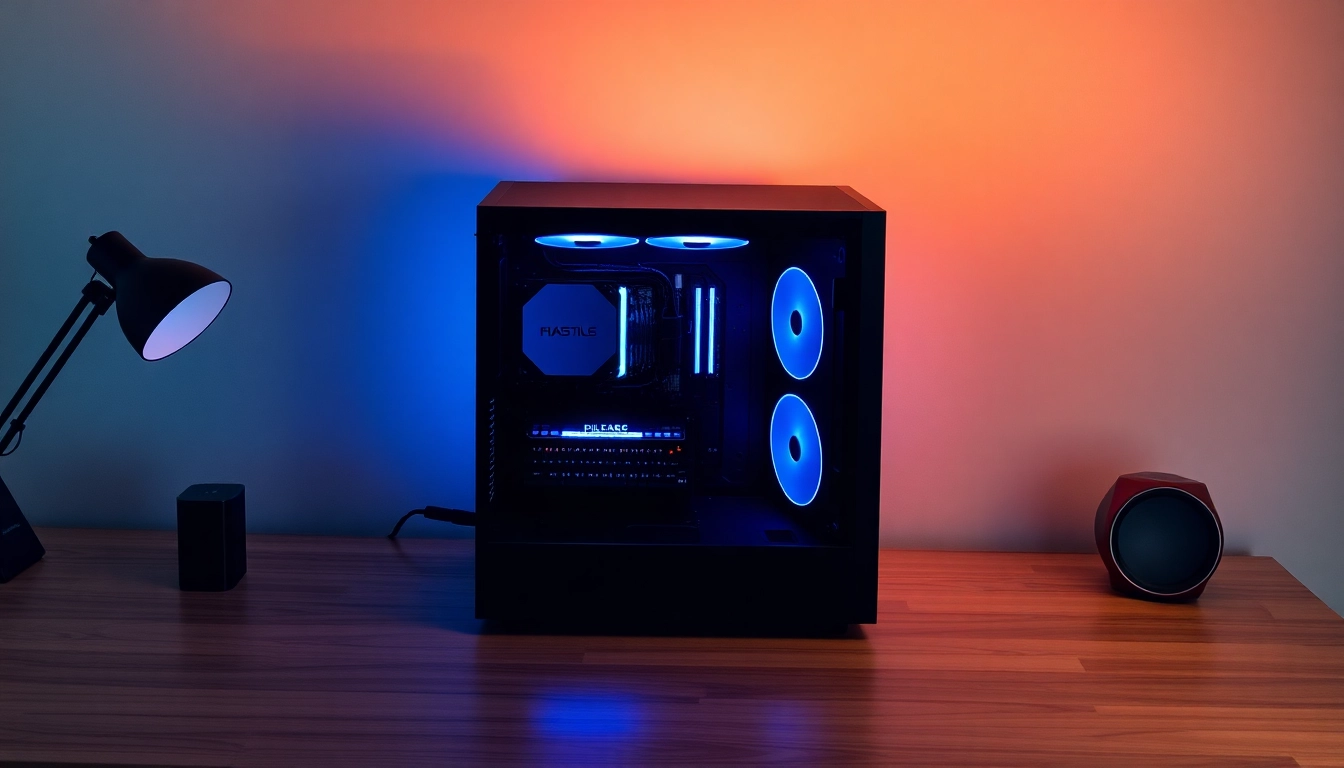Understanding PC Cases and Their Importance
When it comes to building or upgrading a computer, the selection of a PC CASE Supplier is crucial. A PC case serves as the backbone of a computer system, playing a number of roles including protection for delicate components, effective cooling, and aesthetic enhancement. Thus, understanding PC cases is essential not only for tech enthusiasts but also for casual users interested in crafting an ideal setup.
What Makes a Good PC CASE Supplier?
A good PC case supplier should offer a range of features to meet various needs. Here are several attributes to evaluate:
- Quality and Compatibility: Quality materials ensure that cases protect components effectively, while compatibility is crucial for accommodating specific hardware.
- Variety and Selection: A robust selection of different styles, sizes, and brands enables customers to find the ideal case for their needs.
- Customer Support: Accessible customer service is often indicative of a company’s reliability, providing customers with answers to inquiries pre- and post-purchase.
- Reviews and Reputation: Positive customer reviews and a solid reputation in the market bolster confidence in a supplier’s offerings.
Key Features to Look for in PC Cases
Choosing the right PC case entails evaluating specific features that contribute to functionality and aesthetics:
- Size: Cases come in a variety of sizes, including Mini-ITX, Micro-ATX, and ATX. The size should accommodate the motherboard and provide enough room for cooling systems.
- Cooling Options: Adequate airflow and cooling are vital for long-term performance; look for cases that support various fan configurations and even liquid cooling systems.
- Cable Management: A design that includes routing options and space to hide cables can vastly improve both aesthetics and airflow.
- Build Quality: Robust materials, superior assembly, and ease of access—features such as tool-less drive bays enhance user experience.
Common Misconceptions About PC Cases
Several misconceptions plague the discussion around PC cases, often leading to poor selection choices:
- “All PC Cases are the Same”: Different cases cater to varying needs such as cooling efficiency, aesthetics, and spatial requirements.
- “Bigger is Always Better”: While larger cases offer more space for components and airflow, smaller or mid-sized cases can be just as effective in handling heat with appropriate design and cooling options.
- “You Don’t Have to Worry About Airflow”: Excellent airflow is critical for maintaining a stable operating environment. Neglecting airflow can lead to overheating, reducing component longevity.
Varieties of PC Cases Available
The diversity of PC cases in the market caters to a wide range of user requirements, from gaming to professional workstations. Understanding this variety can enhance your purchasing decisions.
Gaming vs. Workspace PC Cases
Gaming PC cases are generally designed with enhanced cooling options, flashy aesthetics, and sometimes RGB features to match the gaming setup’s theme. In contrast, workspace PC cases often favor a more muted, professional appearance, with features focused on functionality and easy maintenance. The choice between these types depends on your use case and personal preferences.
Form Factors: ATX, Micro-ATX, and Mini-ITX
PC cases come in differing form factors, which affects their size and the type of components they can accommodate:
- ATX Cases: Standard size for gaming and high-performance setups, typically supports multiple GPUs and extensive cooling systems.
- Micro-ATX Cases: Slightly smaller, suitable for mid-range builds, offering a balance between performance and size.
- Mini-ITX Cases: Ideal for compact builds, these cases allow for portability but typically limit options for extensive cooling and upgrades.
Tempered Glass Cases: Style Meets Functionality
Tempered glass cases have become quite popular in the gaming community due to their aesthetic appeal. These cases offer a sleek and modern look while enabling visibility of internal components, including RGB lighting. However, it’s essential to consider cooling options since glass can retain heat, impacting performance if not adequately ventilated.
Choosing the Right PC Case for Your Needs
Making the right choice when selecting a PC case can hinge on several critical factors that align with your specific requirements and hardware compatibility.
Assessing Your Hardware Compatibility
Before selecting a case, it’s vital to assess compatibility with your components. Measure the size of the motherboard, CPU cooler, GPU, and any additional storage or cooling systems you plan to install. Many manufacturers provide specifications detailing compatible components, making it easier to narrow down options.
Understanding Cooling Options in PC Cases
Cooling is an integral aspect of PC performance. Consider cases that support various cooling configurations, such as fan placements or radiator mounts for liquid cooling solutions. Look for cases that provide good airflow pathways to move air through the build effectively.
Design Considerations for Aesthetic Appeal
The design of your case also impacts how it fits into your environment. If aesthetics are important, choose a case with features like RGB lighting, customizable panels, and tempered glass. Balance out your preferences with functionality to ensure that your case doesn’t just look appealing, but it also meets performance needs.
Choosing a Reliable PC CASE Supplier
Finding a trustworthy supplier is vital to ensuring high-quality products and support. Here’s how to select the right one.
What to Look for in a Supplier
The following considerations help ensure you choose a reliable PC CASE supplier:
- Established Reputation: Opt for suppliers with a strong track record in the industry, highlighting longevity and customer loyalty.
- Product Variety and Availability: A reputable supplier should offer a wide selection of brands, allowing customers to browse various pricing and features.
- Warranty and Return Policies: These policies provide peace of mind; reputable companies should offer clear terms regarding product warranties and return procedures.
- Technical Assistance: The ability to obtain assistance during the selection process or set up is invaluable, especially for those new to building PCs.
Benefits of Buying from a Reputable PC CASE Supplier
Purchasing from a well-regarded supplier provides numerous advantages:
- Quality Assurance: Reputable suppliers typically maintain strict quality control measures, minimizing the risk of receiving defective products.
- Enhanced Customer Service: A solid customer service team can assist with questions or concerns that may arise both during and after the purchase.
- Access to Industry Knowledge: Established suppliers often provide valuable insights and support for your build, recommending products suited to your needs.
Top PC CASE Suppliers on the Market
Some of the most reputable PC case suppliers include:
- Cooler Master: Known for a variety of gaming cases focused on cooling efficiency and modular designs.
- Corsair: Offers premium cases with extensive cooling options, durability, and aesthetic designs.
- Lian Li: Renowned for high-quality aluminum cases that marry style and functionality.
- Fractal Design: Recognized for minimalistic yet functional cases that prioritize airflow and component accessibility.
Building Your Custom PC Case Setup
Once you’ve chosen a case, the next step is to build your custom setup. This process can be straightforward with the right guidance.
Step-by-Step Guide to Assembling Your PC
- Prepare Your Workspace: Create a clutter-free environment with appropriate lighting and tools on hand.
- Install the Power Supply: Secure the power supply within the designated area in the case.
- Add the Motherboard: Carefully align the motherboard with the standoffs and secure it using the appropriate screws.
- Install CPU and Cooler: Insert the CPU according to guidance and attach the CPU cooler, ensuring proper thermal paste application.
- Add RAM: Insert RAM sticks according to the motherboard’s specifications.
- Install Storage Drives: Mount SSDs or HDDs into the slots provided within the case.
- Add GPU: Slot in the graphics card and secure it in place.
- Cable Management: Route cables in an organized manner to improve airflow and aesthetics.
- Final Checks: Ensure all components are secured and connected properly before closing up the case.
Essential Tools for Building a PC
As you prepare to build your custom PC, ensure you have the right tools to simplify the process:
- Philips screwdriver: Essential for securing components in place.
- Anti-static wrist strap: Prevents static discharge that could damage delicate components.
- Wire cutters: Helpful for organizing and trimming cables for better airflow.
- Thermal paste: IMPORTANT for CPU installation to ensure proper heat transfer.
Post-Build Testing and Troubleshooting Tips
Once your build is complete, proper testing can ensure everything runs smoothly. Here are some troubleshooting tips to guide you:
- Boot Process: Ensure the system powers on and displays on your monitor. If it doesn’t, verify all connections are secure.
- Temperature Monitoring: Run software to check that temperatures remain within safe ranges during normal use.
- Component Functionality: Confirm that all components including GPU, storage, and peripherals are functioning correctly.
- Addressing Issues: If problems occur, go through each connection methodically to troubleshoot the issue, ensuring all hardware is compatible and properly seated.



